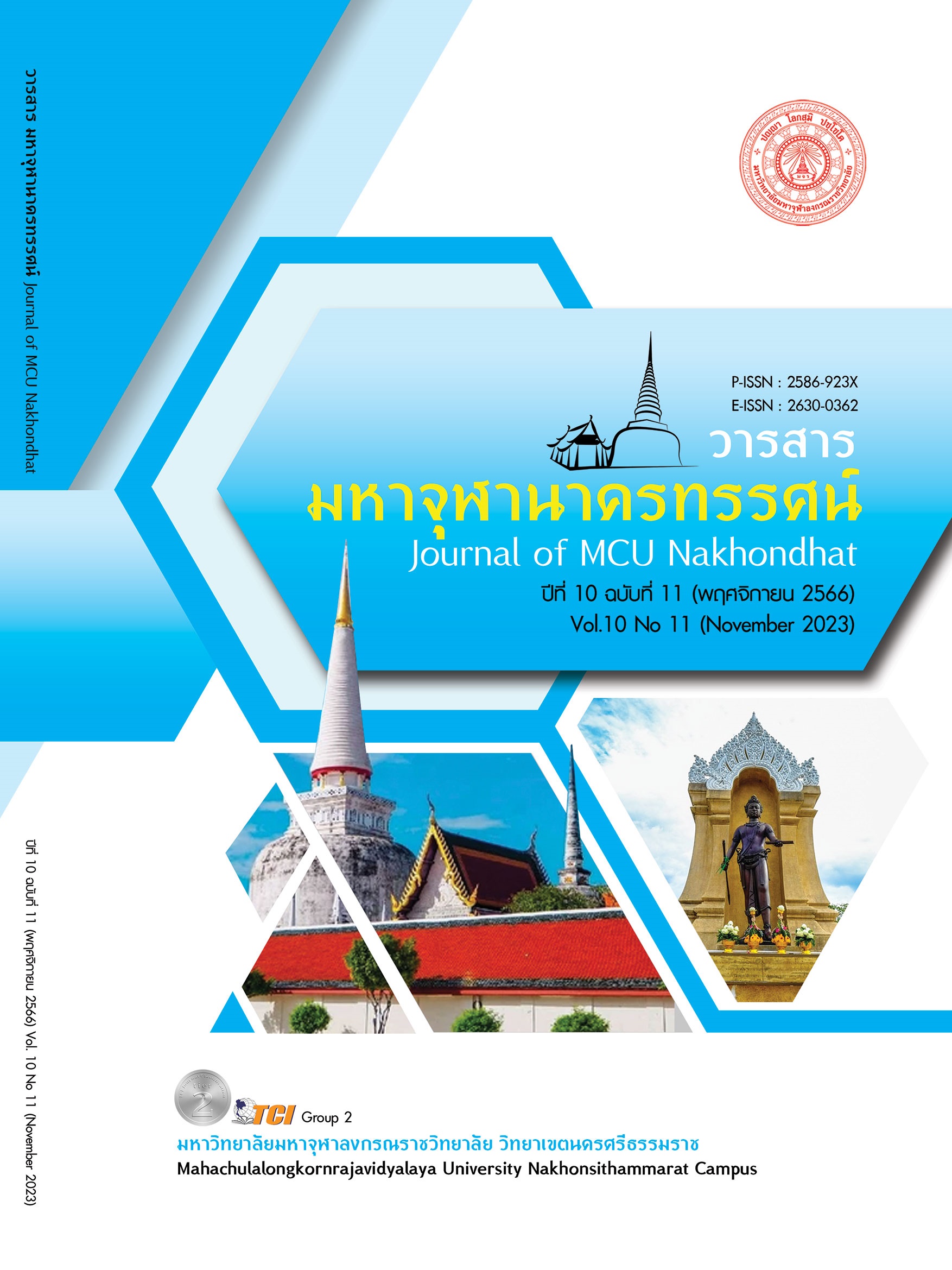MEANINGFULL OF LEARNING CURRICULUM OF COMPETENCY TO 21st CENTURY SKILLS OF BASIC LEVEL EDUCATION STUDENT
Main Article Content
Abstract
This article aims to present guidelines for meaningful learning management based on key competencies of the curriculum for 21st - century skills of primary education learners. Especially at the primary level who want to develop both knowledge and skills/processes. and characteristics (Attributes) appropriate for age. That is linked to the development of skills in the 21st century, which creates core competencies for students according to the Basic Education Core Curriculum 2008 (revised edition 2017). Learners will develop themselves to live in society. the world knowingly about changes and living daily life happily. The school must be the organizer of learning for students to know according to grade level according to the basic education core curriculum. Through the process of organizing learning in the classroom, learners can practice by themselves and summarize the knowledge (Active learning), working collaboratively with groups of friends (Collaborative learning). Therefore, if teacher learning management according to the Basic Education Core Curriculum (Standard Based-Curriculum), which is truly a curriculum based on the current standards. As a result, every learner has quality according to the standards set in the curriculum. Form this article will present guidelines for learning management: 1) Teachers must have awareness and as important in analyze curriculum. 2) Able to analyze all learning standards and indicators by distinguish of keywords for objectives as knowledge skills/processes and attributes. 3) Able to link form skills/processes to important competencies of learner using something must to choose that something. 4) To create a backward design learning unit that has 3 important elements: 4.1) Setting learning goals with learning standards and indicators as an important. 4.2) Designing learning management that emphasizes teaching and learning using Active learning competencies to 21st century skills as an important. 4.3) Measurement and evaluation that emphasizes workload/pieces of work of setting learning goals as an important.
Article Details

This work is licensed under a Creative Commons Attribution-NonCommercial-NoDerivatives 4.0 International License.
References
กระทรวงศึกษาธิการ. (2546). พระราชบัญญัติการศึกษาแห่งชาติ พ.ศ. 2542 และที่แก้ไขเพิ่มเติม (ฉบับที่ 2) พ.ศ. 2545 พร้อมกฎกระทรวงที่เกี่ยงข้องและพระราชบัญญัติการศึกษาภาคบังคับ. กรุงเทพมหานคร: โรงพิมพ์องค์การับส่งสินค้าและพัสดุภัณฑ์ (ร.ส.พ.).พิมพันธ์ เตชะคุปต์ และพเยาว์ ยินดีสุข. (2551). การเรียนรู้เพื่อความเข้าใจในกระบวนการออกแบบแบบย้อนกลับ. กรุงเทพมหานคร: สำนักพิมพ์แห่งจุฬาลงกรณ์ราชวิถีวิทยาลัย.
วรรณดี สุทธินรากร และคณะ. (2564). การพัฒนาหลักสูตรฐานสมรรถนะและการจัดการเรียนรู้อย่างมีความหมาย. กรุงเทพมหานคร: บริษัทภาพพิมพ์ จำกัด.
สำนักงานคณะกรรมการการศึกษาขั้นพื้นฐาน. (2552). ตัวชี้วัดและมาตรฐานการเรียนรู้แกนกลาง กลุ่มสาระการเรียนรู้ภาษาไทย ตามหลักสูตรแกนกลางการศึกษาขั้นพื้นฐาน พุทธศักราช 2551. กรุงเทพมหานคร: โรงพิมพ์ชุมนุมสหกรณ์การเกษตรแห่งประเทศไทย จำกัด.
สำนักงานคณะกรรมการการศึกษาขั้นพื้นฐาน. (2552). หลักสูตรแกนกลางการศึกษาขั้นพื้นฐาน พุทธศักราช 2551. กรุงเทพมหานคร: โรงพิมพ์ชุมนุมสหกรณ์การเกษตรแห่งประเทศไทย จำกัด.
สำนักงานคณะกรรมการการศึกษาขั้นพื้นฐาน. (2566). ร่วมประชุมสื่อสารสร้างความเข้าใจเกี่ยวกับตัวชี้วัดระหว่างทางและตัวชี้วัดปลายทาง ตามหลักสูตรแกนกลางการศึกษาขั้นพื้นฐาน พุทธศักราช 2551 และแนวทางการวัดและประเมินผลการเรียนรู้ตัวชี้วัดระหว่างทางและ. เรียกใช้เมื่อ 4 สิงหาคม 2566 จาก https://drive.google.com/drive/u/0/folders/1xtYd_nf2Ds823YHyprdWbL31YjRD_Ke
สำนักทดสอบทางการศึกษาแห่งชาติ. (2566). สอบถามค่าสถิติพื้นฐานทั่วประเทศ(ทุกระดับ). เรียกใช้เมื่อ 27 ตุลาคม 2566 จาก https://niets.or.th/th/catalog/view/2989
Anderson, L. W. & Krathwohl, D. R. (2001). A taxonomy for learning teaching and assessing: revision of Bloom’s taxonomy of educational objectives. New York: Longman.
Bloom, B. S. . (1956). Taxonomy of educational objectives: Classification of educational goals. Handbook 1: Cognitive domain. New York: Longman.
Tyler, W. (1950). Basic Principles of curriculum and Instruction. Chicago: University of Chicago Press.
Wiggins, G. & McTighe J. (2006). Understanding by Design (2rd ed.). U.S.A.: Association for Supervision and Curriculum Development (ASCD) publications.


